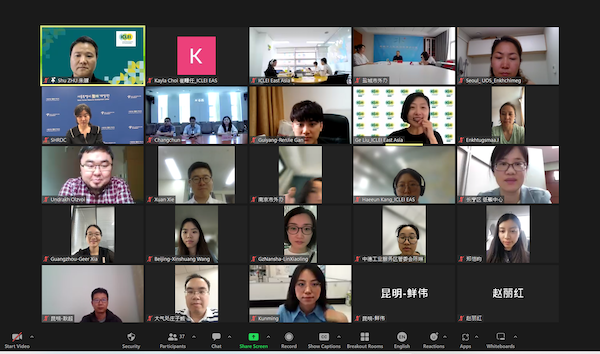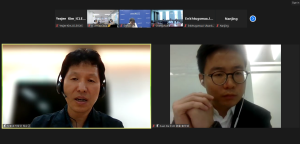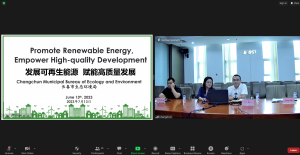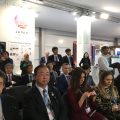Empowering Chinese and Mongolian Cities: ICLEI East Asia and SHRDC Drive Climate Actions for a Sustainable Future

ICLEI East Asia and Seoul Human Resource Development Center (SHRDC), in collaboration with Seoul Metropolitan Government (SMG), proudly concludes the 2023 Training Program for Chinese and Mongolian cities on climate actions held through July. The theme “Building Efficiency and Energy Transition for Climate Ambitions” was strategically chosen to address the crucial role these areas play in driving cities’ climate actions.

Group photo of the training program
The program was tailor-made to empower policymakers from Chinese and Mongolian cities with the knowledge and capacity necessary to lead impactful climate initiatives within their communities. A total of 63 policymakers participated in the program, with representatives from nine Chinese cities and five Mongolian observers. The participants were introduced to SMG’s latest climate actions, with their learning experience enriched by insights from experts representing ICLEI and Korea’s Hydrogen Convergence Alliance (H2Korea).
The training event was thoughtfully structured into two components, ensuring a comprehensive learning experience for all attendees. The first component, self-paced training courses, enabled participants to access and study the content at their own convenience. The second component consisted of live lectures, encouraging discussions between speakers and participants.

One of the self-learning lesson videos featuring Dr. In-chang Hwang from Seoul Institute
Through self-learning sessions, participants delved into Seoul’s actions on three key topics – carbon neutrality, air quality management, and green transport transition. Esteemed speakers from Seoul Institute and SMG shared insights on Seoul’s roadmap for carbon neutrality, strategies to address air pollution sources, transport demand management, and electric vehicle (EV) adoption plans.

Jeong-seon Kim from SMG answers questions from the floor

Hong-seok Lee from SMG delivers a lecture on Seoul’s buildings emissions reductions policies
The live sessions highlighted SMG’s ambitious efforts towards achieving carbon neutrality by 2050 and driving building efficiency improvements. During the first session, Jeong-seon Kim, Director of Climate & Environment Policy Division at SMG, provided a comprehensive overview of the city’s 2050 carbon neutrality policies. To reach this goal, SMG has implemented five Net-Zero Strategies, focusing on areas including Green Building, Green Mobility, and Green Energy. The city’s innovative Climate Budget system was also implemented to minimize carbon emissions in various projects. In the subsequent session, Hong-seok Lee, Team Leader of the Eco-Friendly Building Division at SMG, presented Seoul’s action plans for decarbonizing its building stock, emphasizing the Zero-Energy Buildings (ZEBs) mandates and the potential of wood buildings. Through initiatives such as the “Citizens’ Committee of Green Seoul,” SMG further demonstrated its dedication to sustainable policies and public-private partnership governance, actively promoting waste separation and reduction during the pandemic. With these proactive measures, Seoul continues to lead the way towards a greener and more sustainable future.

Xuan Xie buttresses the use of clean hydrogen
Given the increasing interest of cities on hydrogen, experts were invited to discuss the potential of clean hydrogen and its role in achieving carbon neutrality. Xuan Xie, Program Officer at ICLEI East Asia, outlined the potential of clean hydrogen in decarbonizing challenging sectors and integrating renewable energy, despite facing hurdles such as high costs and technical obstacles. To achieve a net-zero future, he emphasized the need for increasing the market share of green hydrogen production while gradually phasing out gray hydrogen. Cities were encouraged to develop comprehensive hydrogen strategies, incorporating the entire value chain and promoting international cooperation. Soon-kyu Jung, Director of Eco-Friendly Vehicle Division at SMG, shared Seoul’s plans to scale up hydrogen vehicles and refueling stations significantly by 2030, along with the importance of green hydrogen production based on renewable energy. Arthur Hinsch, Officer at ICLEI Europe showcased European examples on hydrogen application, such as Hellenic Hydrogen’s installation in Greece’s coal region and Steinfurt’s integration of hydrogen with regional wind turbines. Changjong Kim, Chief Researcher of the Standard & Safety Department from H2Korea, highlighted private sector engagement, emphasizing the significance of enhancing regulatory frameworks against the backdrop of growing demand for hydrogen applications. The discussion underscored collaboration and strategic efforts to drive clean hydrogen adoption for a sustainable energy future.

Soon-kyu Jung from SMG answers questions from the floor

Arthur Hinsch from ICLEI Europe shares cases on hydrogen applications in Europe
During the case-sharing section, three speakers from China and Mongolia presented their efforts towards sustainability and carbon neutrality. Tianjin Xu from Beijing Municipal Ecology and Environment Bureau emphasized the city’s carbon neutrality plans in line with China’s national goal. Beijing has implemented a pilot Emission Trading System and engaged citizens in carbon reduction projects through the MaaS project platform. Wei Li from Changchun Municipal Ecology and Environment Bureau highlighted Changchun’s focus on renewable energy resources, especially wind and hydrogen energy. The city aims to develop hydrogen energy clusters and promote hydrogen vehicles while facing challenges in safety planning and technical development. Sukhragchaa Mijidsuren from the Ministry of Environment and Tourism of Mongolia shared the country’s commitment to renewable energy and transitioning from a carbon-intensive ‘brown market’ to a sustainable ‘green market’. Mongolian cities are targeting a significant increase in renewable energy sources to achieve carbon neutrality by 2050.

Mr. Wei Li shares Changchun’s renewable energy policies
The training program yielded remarkable results, empowering participants and showcasing Seoul’s climate leadership, while accelerating the journey towards carbon neutrality for the participating cities. The program’s overall impact has been substantial, driving participating cities closer to their carbon neutrality goals, which are essential for meeting the objectives of the Paris Agreement and mitigating the severe impacts of climate change on people’s lives.
ICLEI East Asia and SHRDC will continue to provide capacity building and promote international cooperation to support cities’ climate actions. With a firm belief in the power of capacity-building and collaboration, ICLEI strives to empower local governments, communities, and stakeholders with the latest tools, strategies, and best practices to tackle pressing climate challenges. Together with our partners and stakeholders, we are dedicated to nurturing a region that thrives on low-carbon and resilient practices, fostering lasting transformations for generations to come.
Author: Xuan Xie (xuan.xie@iclei.org)
Contributors: Haeeun Kang (haeeun.kang@iclei.org), Kayla Choi (kayla.choi@iclei.org)




